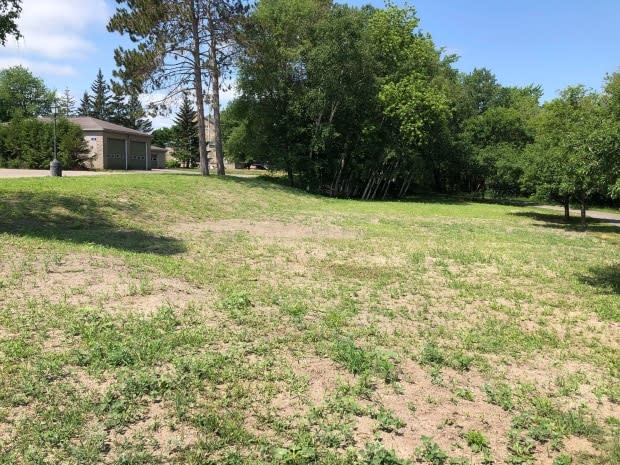Homeless people and shelters face new realities of COVID-19
The pandemic has complicated the lives of homeless people in New Brunswick, as well as the jobs of the people who support them.
Shelter capacities are somewhat diminished because of physical distancing requirements, but 45 available shelter spaces in Moncton are not even being used.
Only 90 people are staying in Moncton shelters, said Trevor Goodwin, the senior Director of Outreach Services for the Moncton YMCA.
Meanwhile, 200 other people in the city and surrounding areas are homeless.
One thing that could have been keeping people away is that earlier in the pandemic, shelter guests were only allowed out for short periods of time and for limited reasons such as medical appointments.
Those restrictions have been slowly eased up, said Goodwin.
Drop-in program still suspended
But the House of Nazareth has yet to reopen its drop-in centre.
Manager Jessica Delez cited two reasons for that decision.
First, she said, shelter officials cannot do the monitoring that's required during the pandemic when people only stop in briefly for a shower or something to eat.
Second, she said, the shelter is "still dealing with a lot of drug trafficking," and people who come in and "cause trouble."
Delez said there is plenty of room, however, for people who wish to stay at the shelter.

The House of Nazareth has only been operating at 50 to 60 per cent capacity, said Goodwin, while Harvest House has been consistently quite full.
The organizations do their best to monitor client movements, said Goodwin. And the Salvus Clinic does medical checks and testing in both of the shelters weekly.
Outreach workers have been "extremely busy," Goodwin said.
"We actively meet with as many individuals as possible and provide a myriad of services and supplies to those sleeping rough as well as assist case management for those in shelter — on top of those on the street."
The lack of a drop-in centre, combined with restrictions at places such as malls and libraries, means there are few places to get out of the elements.

To compensate for the closure of some washrooms in public and private establishments, the City of Moncton has installed a portable washroom in the downtown area, said Goodwin.
There are also water filling stations available throughout the city, he said, and outreach staff have been handing out bottles of water and freezies during the heat.
It would be nice if someone "stepped up" to provide water on hot days in Fredericton, said Warren Maddox, executive director of Fredericton Homeless Shelters Inc.
Many people know they can go to the shelter door for bottled water, said Maddox, but supplies are limited, and they can always use more.
The City of Fredericton said it's not feasible to operate its drinking fountains with COVID-19 restrictions. But all washrooms are now open and porta-potties have been placed at various sports fields.

With COVID distancing rules, Fredericton shelters have the capacity to house 45 of the 60 to 70 homeless people in the city, said Maddox. About a dozen people are tenting here and there, he said.
In March and April, Grace House was turned into an isolation space, said Maddox, and special staff were hired.
About a dozen shelter guests had to undergo isolation periods, he said, but all tested negative for COVID-19.
"It was a long, long spring, but we're into a new groove now."
The new reality of shelter life includes more questions for anyone entering, temperature checks twice a day, and contingency plans for anyone who shows symptoms.
"It isn't as big an issue as we feared it might be," said Maddox, noting the pandemic has increased workload quite a bit as well as expenses, by 15 to 20 per cent.
Maddox credited the people who stay at the shelter for embracing COVID-19 prevention measures.

"Yes, I'm serious about it," said shelter resident Rodney Gerow. "I don't want to get COVID."
"Six feet is a given now," Gerow said. "I'm a clean freak now because of this."
Chris Gorman, system planner with the Human Development Council, said shelter guests and staff in Saint John deserve praise as well.

The shelters in Saint John were able to maintain pretty consistent occupancy during the past few months, Gorman said.
That's mainly because they were able to move into larger locations. The Department of Social Development was a "huge help" in making those moves possible, he said.
"From our perspective, we are really proud of how the homeless sector and especially the shelters across the province handled themselves during the pandemic."
The major concern, he said, was that COVID-19 would get into the shelters and quickly spread.
"But so far there have been no known cases in our shelters, and that is a huge win."
Gorman said he hoped that trend would continue in the coming months.
Maddox said he will be watching the impact of the opening of provincial borders to other Atlantic provinces, but he doesn't expect it will create any new problems.
And even the prospective opening to other provinces is unlikely to directly affect the homeless population.
There used to be somewhat of a seasonal, east-west ebb and flow, Maddox said, but less so in recent years. He said the provincial border closure has had almost no impact on homeless numbers.


